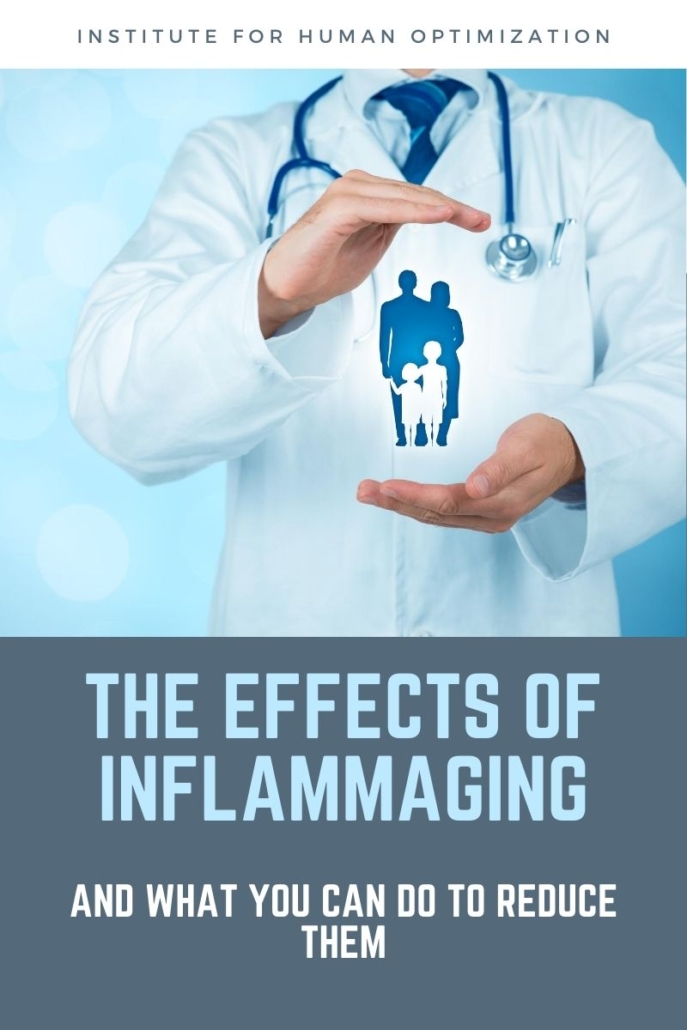The “Inflammaging” Phenonemon and What You Can Do About It
If you read our “Hallmarks of Aging” post, you know the build up of cytokines and other cellular debris is one of the main reasons we age. This week we’re focusing on the inflammatory state that leads to aging, also known as “inflammaging.” We’ll go into the cellular mechanisms responsible for this phenomenon as well as some practical changes you can make to reduce inflammaging and feel healthy into your golden years.
Aging is the ultimate bane of human existence. Researchers and medical professionals have spent countless hours studying cells and tissues, trying to find out why we age and how we can thwart the process. The anti-aging industry is globally worth 50-billion US dollars and the beauty industry is constantly touting new products to stave off wrinkles and keep you looking young.
But in the end, inflammation is the main culprit. In 2000, Claudio Franceschi coined the term “inflammaging“, referring to the persistent, low-grade state of inflammation that is responsible for all the problems that come with aging.
Your cells are born, reproduce, and die by the millions and your body is generally adept at flushing out the waste. However, as we go about our lives, there are countless environmental factors that chip away at these mechanisms, making the body less efficient at clearing cellular debris. When this cellular debris piles up, proteins known as cytokines alert the immune system, causing inflammation and even damaging healthy cells nearby. This is the inflammaging process- a constant state of mild inflammation that eventually leads to the physical and mental decline we associate with getting older.
Researchers are always working to unearth the “fountain of youth” that may be buried somewhere in our genes. Until then, you can take proactive steps to reduce inflammaging by eliminating inflammatory responses as much as possible.
Anti-inflammatory diet
There is a bustling kingdom inside your gut; a colony of bacteria responsible for breaking down food, producing vitamins and regulating your immune system. This is called your microbiome and the more we study it, the more we realize that having a flourishing array of healthy gut bacteria is vital for aging well and avoiding disease.
Your gut has evolved to handle a wide variety of fiber and polyphenol-rich foods, developed over millions of years of evolution. It’s no shock that when we switched to a nutrient-poor Western-style diet our gut kingdoms revolted, causing havoc on our immune system. Your stomach doesn’t understand french fries as real food and alerts the immune system to a threat, causing low-grade inflammation.
The best way to decrease the effects of inflammaging therefore, it to eat a diet similar to what our ancestors ate. This is a loaded question, as dietary studies are numerous and often unreliable due to countless variables. The diet you should be consuming somewhat depends on your genetics; what causes inflammation for some people, can be innocuous for others.
A good place to start is by eliminating processed foods. Chips, cookies, crackers- basically anything packaged with a shelf life contains un-natural substances unfit for a healthy microbiome. Foods that are generally considered inflammatory include refined flours, sugar, gluten, milk, cheese, red meat, and trans- and saturated fatty acids.
A study published in March 2020 put individuals with rheumatoid arthritis (a debilitating inflammatory autoimmune disorder) on a diet that eliminated pro-inflammatory foods and replaced them with whole, natural foods containing plenty of polyphenols and flavonoids. Even if you’re not suffering from a disorder, you can still take note of the study’s creation of a diet with a high content of known potential anti-inflammatory ingredients:
- fatty fish such as sardines or tuna, twice per week
- daily intake of chia seeds and flaxseed oil
- daily intake of nuts, avocado, and/or sesame seeds or tahini
- avoid pre-cooked food, red meat, and processed meat
- cook by baking, boiling or vapor- avoid frying
- include daily green leafy vegetables (arugula, lettuce, broccoli, zucchini, green beans)
- include daily fruits
- consume whole grains and avoid refined flours
- daily yogurt (a brand that contains Lactobacillus Casei among other species or miso)
- substitute plant-based milk (almond, rice, coconut) for dairy
- season with turmeric, black pepper, and ginger (black pepper and ginger should be used at the same time)
- keep salt intake low by eliminating pre-cooked food
- increase consumption of garlic, onion, purple carrot and zucchini
- substitute sugar for honey and avoid sodas and juices
- try a daily dose of apple cider vinegar
There are a host of other doctors, nutritionists, and researchers that have created diet plans to benefit your microbiome and reduce the effects of inflammaging. Dr. Andrew Weil has his anti-inflammatory pyramid. Dr. Susan Blum recommends “rainbow dieting” or, eating natural foods of every color every day to get the full range of anti-inflammatory polyphenols.
As you can see, these diets are not restrictive and are a great way to lower your body’s inflammation response and increase your healthspan.
Autophagy
When it comes to aging and longevity, we never stop talking about autophagy, the cellular housekeeping your body does to clear out damaged cells and make room for new ones. We already know inflammaging is a direct result of the piling up of senescent (or “zombie”) cells, triggering an immune response and causing problems over time. Initiating autophagy is one of many solutions to low-grade, chronic inflammation.
You can do this by going approximately 18-20 hours a day without eating. This is commonly known as time-restricted eating or intermittent fasting.
In rodent studies, a fasting routine was proven to be effective in reducing risk factors for age-related diseases. It lowered the risk of metabolic diseases such as cancer, diabetes, and obesity and increased cognitive ability. This is a simple hack that mimics the natural feeding/fasting cycles of our ancestors and allows the microbiome and immune system to function properly.
Please check with your physician before attempting extended fasts.
Turmeric
You’ve probably seen this yellow powder on the spice shelves or have even used it for its flavoring. Turmeric is the ground up version of the turmeric rhizome, a perennial plant that resembles a large orange ginger root. it has been used throughout human history for its health properties and has become a staple in any biohackers kitchen.
This is because turmeric contains a very important polyphenol called curcumin, a known antioxidant. This substance gives turmeric its vibrant color and also inhibits enzymes that mediate inflammatory processes, making it anti-inflammatory by nature.
To take the hack one step further, it’s recommended to use turmeric and black pepper together, as the piperine in the pepper enhances curcumin absorption into the body, making sure you’re getting the full bang for your buck. So sprinkle some turmeric and pepper on your salads, soups, or even smoothies to get the full benefits of this anti-inflammatory spice.
Omega 3
The inflammaging process is complicated and involves many mechanisms happening at once. Senescent cells build up, certain compounds are created to alert the immune system, and inflammation is the by-product.
Thankfully, studies have been conducted on the intricate cellular functions that cause this and it’s been found that Omega-3 (commonly supplemented as fish oil) changes the fatty acid composition of cells involved in the inflammatory response, having a positive effect on overall health.
You can get Omega-3 fatty acids by eating plenty of fish and flaxseed, or by supplementing orally. Always try to purchase supplements from a reputable company to ensure quality.
Inflammation is neither friend nor foe. It is a vital part of immunosurveillance and defense, yet can also be a symptom of chronic disease. When it occurs consistently due to poor gut health or inefficient autophagy, it serves as a risk factor for age-related diseases and is known as inflammaging,
By being proactive with your life choices- eating anti-inflammatory foods, incorporating fasting, and supplementing with turmeric and Omega-3, you can lower your inflammatory markers and have positive effects on your healthspan and day-to-day well-being.
At the Institute for Human Optimization, we take inflammaging seriously. Instead of waiting for the effects of chronic inflammation to present themselves, we encourage our patients to eat according to their genome and test for specific biomarkers for a personalized approach to healthcare.
The goal of functional medicine is to get to the root cause of disease. This almost always stems from purposeful prevention. Nothing manifests overnight. It is your everyday habits that create your healthspan, whether you see the effects or not. We give you a deep dive into what’s really happening in your body so you can make educated decisions to age well and live better.
Schedule a call to discuss how we can optimize your health.






Leave a Reply
Want to join the discussion?Feel free to contribute!